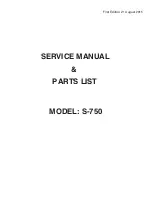
9
Character input and command key table
、
、。
、。
“
かな
”
Hiragana
“
英
”
English
“
カナ
”
Katakana
“
数
”
Numbers
! ?/
ー
#
‚
; :
|
・
’ ”
( ) [ ] { }
〈 〉「 」
ワヲン
ー
!? ( )
あいうえおぁぃぅぇぉ
かきくけこ
さしすせそ
たちつてとっ
なにぬねの
はひふへほ
まみむめも
やゆよゃゅょ
らりるれろ
わをん
ー
!? ( )
アイウエオァィゥェォ @
・
̲ ー & $ ¥ % + =
〜
^
D E F d e f
G H I g h i
J K L j k l
M N O m n o
P Q R S p q r s
T U V t u v
W X Y Z w x y z
カキクケコ
サシスセソ
タチツテトッ
ナニヌネノ
ハヒフヘホ
マミムメモ
ヤユヨャュョ
ラリルレロ
1
2
3
4
5
6
7
8
9
0
A B C a b c
、。
Character
Dial key
Used to change the character input mode.
Used to move the cursor to the left and right.
Used to delete a character.
Used to insert a space.
Command keys
(Main unit),
(Portable handset)
(Main unit),
(Portable handset)
文字切替
(Main unit),
(Portable handset)
クリアー
(Main unit),
(Portable handset)
●
When entering e-mail address, the small letters are displayed before the capital letters.
●
When entering e-mail address, you can not enter the following symbols:
、。
ー
. 「 」
●
When entering e-mail address, you can enter only English and Numbers.
●
When entering e-mail message, pressing
enables you to begin the new line. ( “ ” is displayed.)
●
The display items of the main unit are somewhat different from those of the portable handset.
Portable
(
handset
)
Main
(
unit
)
Pressing the dial keys will select a character as shown below.










































